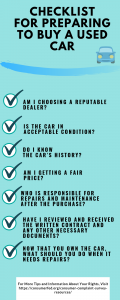When you are buying a used car, getting the answers to these questions before you commit can save you money and aggravation down the road.
Am I choosing a reputable dealer?
Research consumer complaints with your state’s Attorney General’s Office (found through www.naag.org) and the Better Business Bureau (www.bbb.org), and through internet searches.
Is the car in acceptable condition?
- Carefully and completely inspect the car’s exterior and interior.
- Take the car on an extended test drive on highways, in stop-and-go traffic and in other conditions.
- Have an independent mechanic of your choosing inspect the car.
- Don’t buy a car sight-unseen unless you can arrange for a mechanic you trust to inspect it first.
Do I know the car’s history?
Use the Vehicle Identification Number (VIN) to:
- Research the car owner, the most recent odometer reading and other facts at www.vehiclehistory.gov.
- Check on issues such as flood damage through the National Insurance Crime Bureau (www.nicb.org).
Review all available service records, including work the dealer has performed since buying the car, and obtain copies for your records.
Research safety recalls through the National Highway Traffic Safety Administration (www.nhtsa.gov/recalls) and if there were defects, ask the dealer if they have been repaired.
Am I getting a fair price?
Research the price using guides such as the National Automobile Dealers Association (www.nadaguides.com), Edmunds (www.edmunds.com) and Kelley Blue Book (www.kbb.com).
If you are financing the purchase, know when the monthly payments will be due, and understand all late fees.
Consider the total price, not just your monthly payments.
Understand how interest is being calculated on your car loan. (Dealers offering little or no interest often charge much more than a car is worth.)
If you are trading in a car that still has a loan on it, contact the lender two weeks after the transaction to confirm that the loan has been paid off.
Who is responsible for repairs and maintenance after the purchase?
Know whether the car is being sold “as is,” in which case you are generally responsible for repairs as soon as you drive it off the lot. (Some states do not allow “as is” sales by dealers.)
If purchasing an extended service contract, read its terms and conditions. (A service contract is an agreement to repair, replace or maintain a car for a specific period. It differs from a warranty, which is generally offered by the manufacturer or dealer and included in the purchase price.)
Have I reviewed and received the written contract and any other necessary documents?
Confirm that all verbal promises and representations about the car and its condition are in the written agreement.
Make sure there are no blanks on the written agreement; never sign a blank contract.
Obtain a copy of the written agreement.
Obtain the title from the dealer within 30 days of the purchase.
Now that you own the car, what should you do when it needs repairs?
Check the repair shop’s reputation with your state Attorney General’s Office, Better Business Bureau and/or your state’s board of motor vehicle repair, if it has one.
Know whether a warranty or service contract applies to the repair.
While state laws regarding repair estimates vary, a good rule of thumb is that if a repair is expected to cost more than $50, ask for and receive a written estimate.
If a final repair cost is expected to exceed the original estimate by more than 10 percent, make sure the repair shop knows to get your permission in advance.
Before the repair, request that any replaced parts be returned to you. Afterward, make sure to take them.
Get a written receipt that itemizes the repairs and the charges, as well as any warranties, and save that information for your records.
If you experience problems buying or repairing a used car or receiving your title, contact your state Attorney General’s Office or other state or consumer protection agency.
This blog is one of a series of articles contributed by state and local consumer agencies in connection with the annual survey about consumer complaints conducted by Consumer Federation of America. The survey report provides “real life” examples of complaints and tips for consumers. Have a consumer problem or question? Find your state or local consumer agency at https://www.usa.gov/state-consumer.


